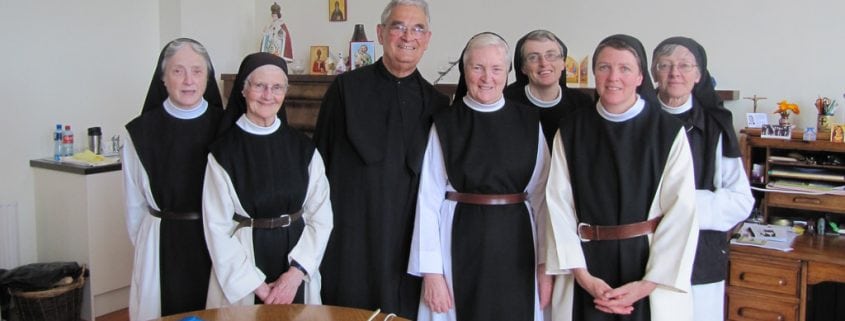Alliance for International Monasticism
Monks and nuns following the Rule of St. Benedict take a vow of stability to their community and ordinarily remain in the monastery they have entered all their monastic life. One monk who takes his stability with him on the road is Fr. Mark Butlin OSB of Ampleforth Abbey, who has been serving on the international team of the Alliance for International Monasticism (A.I.M.) for the past 35 years. A.I.M. was established in 1961 to aid young foundations in different parts of the world within the Benedictine family. This organisation is a joint initiative of Benedictines and Cistercians (OCSO and OCist) and as such is unique as a shared operation. Some communities find themselves isolated by distance from their parent communities and with needs for various resources which A.I.M. seeks to respond to.
Having just returned from Rwanda and India and getting caught in the worst monsoon he tells us in 25 years, Fr. Mark has been visiting monastic communities in Ireland and Britain that support A.I.M. to update us about what is going on in the organisation. His many visits to Benedictine and Cistercian communities all over the world has given Fr. Mark a unique ‘birds-eye’ perspective that most monastics never acquire. Fr. Mark visited us in Glencairn for a couple of days this week, 30-31st August, to meet with the community and share some of the concerns and the life of communities around the world today. His presentation firstly conveyed statistics which gave an interesting picture of the monastic presence worldwide today of the Benedictine family; there are 901 monasteries in Europe, 144 monasteries in the USA, 172 in Latin America, 247 in Asia and 85 in Oceania. In total there are 1175 communities of women and 619 communities of men worldwide. He talked about regions where Benedictine monasticism is thriving, as well as places such as Thailand with its Buddhist tradition which does not offer the ‘soil’ to make Christian monastic foundations. In the case of new foundations ‘distance plays a huge part in a community’s survival’, such as not having an international language with which to access education and formation resources.
A.I.M. seek to address the needs of young communities using various methods; financial assistance is one approach and should not perpetuate dependence. Fostering life is absolutely key, in Fr. Mark’s experience, in the form of spiritual paternity/maternity in passing on wisdom by which to live. Vocational discernment is also an issue where numbers are valued over real monastic callings. In all parts of the world there is a fall in vocations with the rise of consumerism and smaller families. Formation too needs to be concerned not simply with monastic practices and observances but on the faith journey of candidates being formed in the monastic life. The values that A.I.M. promotes in our monasteries are relationships, prayer, communion and stability.
We wish to thank Fr. Mark on behalf of us all for his part in A.I.M. for so many years of service acting as a ‘bonding agent’ of communion in the monastic world and for his additional work for formation for monastics of the Benedictine family with his involvement in the Monastic Formators’ Program.



